Photographs: Reuters Shonalee Biswas
There is something about running in the rains. The water, the clouds, the sweat, and the smell of the stinking sea, all mixed up. And at the end of it all, a cup of garam chai.
"So what are you thinking about?" asked my roommate as I sat sipping my tea.
"Nothing, really. Of this and that and everything else," I replied.
"Now that you are in the thinking mode, may I ask a question?"
"Sure," I replied.
"What will happen in Greece ? Will the country eventually default on its debt?"
"But why are you asking this question?"
"Curious," she said.
"They don't have the money to repay the debt, so they need help from outsiders. Outside help is coming but with some terms and conditions. Sometime back, the Greek parliament approved two bills which authorise a $113-billion package that includes spending cuts by the government as well as sale of shares of government owned companies. This has paved the way for the European Union to come up with a rescue package of around $175 billion."
"Why don't you explain this to me in some detail?"
. . .
Why the situation in Europe is like a forest fire!
Photographs: Reuters
"Let me start at the very beginning. The European Coal and Steel Community was an economic organisation formed by six European nations in 1958. This organisation gradually evolved into the European Union which was established by the Maastricht Treaty in 1993. The EU introduced the Euro on January 1, 1999. On this day, 11 member countries of the EU started using Euro as their currency," I explained.
"So how did this help?"
"It benefited countries such as Portugal, Italy, Ireland, Greece and Spain (together now known as 'PIIGS'). Before these countries started to use euro as a currency, they had to borrow money -- at interest rates much higher than the rates at which a country like Germany borrowed. When these countries started to use the Euro they could borrow money at interest rates close to that of Germany, which was economically the best managed country in the EU."
"And what did they do?" she asked.
. . .
Why the situation in Europe is like a forest fire!
Photographs: Reuters
"They went on a borrowing binge. With interest rates being low, citizens as well as governments went overboard with borrowing. Greek politicians launched a large social spending programme which subsidised most of the key public services," I said.
Going on, I said: "In fact a few years back, the finance minister of Greece claimed that he could save more money shutting down the Railways and driving people around in taxies. In 2009, Greece railways revenues were at around $250 million and the losses of around $1.36billion. All this extravagance has been financed through debt."
"So Greece went overboard with all the borrowing?"
"Yes. And the Greek government debt is expected to cross around 160 per cent of the nation's gross domestic product soon. The other PIIGs countries also did the same."
"But Greece is a small country. Why is it so important after all?"
"As John Mauldin and Jonathan Tepper write in Endgame -- The End of the Debt Supercycle and How it Changes Everything, 'Why is Greece important? Because so much of their debt is on the books of European banks. Hundreds of billions of dollars worth Tiny Greece can make a difference in places far removed from Europe, just like sub-prime debt created a crisis all over the world." So you know what will happen if Greece defaults."
. . .
Why the situation in Europe is like a forest fire!
Photographs: Reuters
"Hmmm. But what exactly is a default?" she asked.
"Governments issue financial securities called bonds, which pay a certain rate of interest, to raise debt. Also these bonds have a certain time period of maturity. Once these bonds mature investors typically rollover the money they get back into new bonds issued by the government. The risk of the same borrower not rolling over his money is referred to as rollover risk. As Mauldin and Tepper explain, 'when a bond becomes due, you have to roll over that bond into another bond. If the party that bought the original bond wants cash to invest in something else or just does not want your bond risk anymore, you have to find someone to buy the new bond'."
"And that's a risk?"
"Yes, it is, especially if foreigners hold a substantial portion of these bonds. 'Greece has a large number of bonds that are coming due soon. It is not just the new debt; they have to find someone to buy the old debt. And that is why they need much money,' point out Mauldin and Tepper. And this is a problem that extends beyond Greece," I explained.
I added: 'About 45 per cent of Spain 's debt is owned by non-Spaniards, and they need to roll over the old debt and new debt of 190 billion Euros this year alone. This is bigger than the entire GDP of Portugal. Spain cannot finance this internally. But will foreigners buy 90 billion Euros (around 45 per cent of 190 billion Euros), and if so, at what price if they are not convinced that Spain will enact serious austerity measures,' the authors point out."
"Any other risks that you would like to point out?" she interrupted.
. . .
Why the situation in Europe is like a forest fire!
Photographs: Reuters
"There are now rumours going around that France is the next country whose AAA rating will be cut to AA+, after the United States rating cut by Standard & Poor's. Also the European Central Bank has stepped into to buy Spanish and Italian bonds which are about to mature to prevent the rollover risk from coming in," I replied.
"What are austerity measures?"
"The traditional way to tackle debt problems has been to resort to austerity measures, i.e. the government spends less and in the process borrows less as well. But when a government spends less; it also leads to shrinking of the GDP because the private sector is not spending anyway. Due to this, the ratio of debt as a percentage of GDP tends to go up, instead of coming down. Also with the government spending lesser, the chances of the economy growing and the government earning more money through taxes is also lower."
"Hmmm, that makes sense. But isn't there a plan to sell government owned companies to prune the deficit?"
. . .
Why the situation in Europe is like a forest fire!
Photographs: Reuters
"That looks like a hurried plan. As The Economist points out, "The planned privatisation of Euro 50 billion (around $72.5 billion) worth of firms and land also looks set to fall short, partly because the forecast prices are over-optimistic and partly because organising a sale every ten days or so is unfeasible. In theory privatisation has the scope to restructure the economy, but a fire sale risks letting the choicest assets fall into the hands of cronies who will manipulate regulation to suit themselves'," I said.
"But what about the private sector? Can't they grow at good rates, paying more taxes to the government and thus helping the government to pay down debt?"
"That's a good question. Let me quote something that economist Bill Bonner wrote in a recent column: 'Greece, a small country with a small GDP and no oil. . . whose strategic export is olives . . . and whose last real military victory was the Battle of Jhelum in 326 BC, in which Alexander the Great defeated an Indian Rajah named Porus.' Does that explain things?"
"I didn't get it."
"Well their strategic exports are olives. And the world suddenly can't be using more olives than it already is."
"Yeah, that's right."
. . .
Why the situation in Europe is like a forest fire!
Photographs: Reuters
"If Greece was a country borrowing in its own currency, they could have simply printed more currency and paid their way out of trouble. But given that Greece uses the Euro, as do the other highly indebted countries in Europe. And so they are not in a position to do that. One option for them is to get out of the Euro and start using their own currency, the Drachma," I said.
Explaining further, I added: "Whether that happens is very difficult to predict. Interestingly, there are now talks about a 'haircut', i.e. the lenders also take in some amount of the loss. Estimates made by Credit Suisse suggest that a 36 per cent haircut on Greece debt will bring down the Greek debt to 100 per cent of the GDP."
"But isn't that as good as a default?"
"Yes it is. Also no real reforms are expected. 'For example cuts in medical spending of Euro 310 billion (around $450 billion) are promised this year. That might sound like a lot, but Greece's over-generous mark-ups to pharmacists add something like Euro 1.5 billion (around $2.2billion) a year of extra spending to its drugs budget alone,' The Economist points out," I said, quoting from the financial magazine.
"So what is the way out?"
"If Greece has to be revived it means going against government policy of last 10 odd years."
"If all that does not happen?"
. . .
Why the situation in Europe is like a forest fire!
Photographs: Reuters
"With or without reform, citizens of Greece are in trouble. All this will 'almost certainly condemn Greece to recession, strife and an eventual debt default'. As Bonner put it, 'So how about this: Give disaster a chance to show its stuff. Let calamity have a go at the problem. Let's all put our hands together and welcome catastrophe.' And what applies to Greece applies to other parts of Europe as well, though in varying degrees."
"What a morbid thought!"
"Yes, it is. Let me give you an analogy that Mauldin and Tepper elaborate on in their book. Forest fires are very common in California (in the United States) and Baja California (in Mexico). The two states have entirely different policies when it comes to dealing with fires."
"Why are we suddenly talking about fires?" she interrupted.
"Allow me to explain. As the authors write, 'Global markets and economies are like forest fires. California and Baja California both have very similar forests and vegetation but have very different fire control policies. In California, small fires are put out regularly by fire-fighters. In Baja California, they are not. Paradoxically, this means that Baja California has many more small fires and almost no major fires, while California has very limited small fires and occasional major, catastrophic fires'," I said.
"Where are we heading to? I still don't understand."
Quoting further from the authors, I said: "Patience. 'Without small fires to clear the brush, enrich the soil, and unlock pine seeds, nature isn't in balance. Avoiding small problems creates greater systemic problems when brush between the trees builds up,' write the authors."
"So?"
"When central banks micromanage small fires -- like the European Central Bank is doing in Greece -- it leads to growing confidence among risk takers. So if Greece is rescued it would mean that the Greeks would feel that even if they repeat the mistakes in the future or don't take the austerity measures seriously, they are likely to be rescued. 'Trying to micromanage small fires in central banking and fiscal policy leads to growing confidence by risk takers, so you get fewer small fires and paradoxically a greater chance of a major catastrophic fire,' point out Mauldin and Tepper," I said.
"So things will only get worse?"
"To put it very mildly, you ain't seen nothing yet!" I replied, getting up to make myself one more cup of tea.
The author can be reached at shonalee.biswas@rediffmail.com

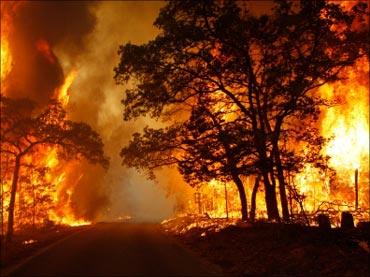
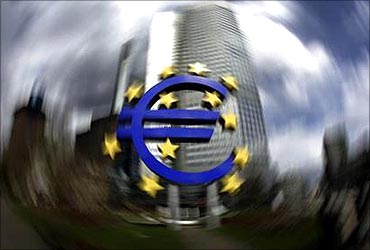

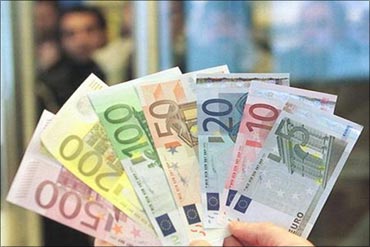
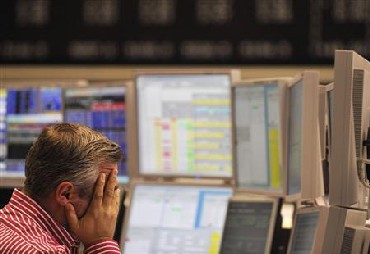

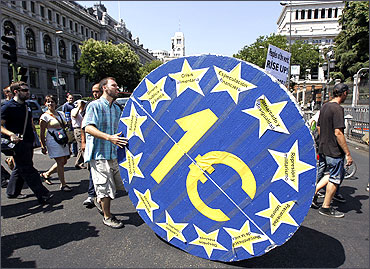
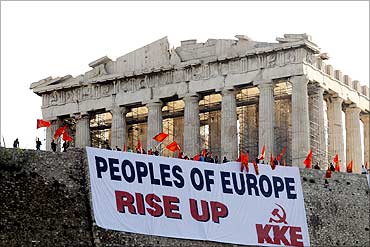
article